Mali
Mali, in long form the Republic of Mali, is a country in West Africa, bordering Mauritania to the west, Algeria to the north-northeast, Niger to the east, Burkina Faso and Côte d’Ivoire to the south-southwest, Guinea to the southwest and Senegal to the west-southwest. Former French colony of French Sudan, Mali became independent on September 22, 1960, after the breakup of the federation of Mali grouping Senegal and the Sudanese Republic. Its motto is “a people, a goal, a faith” and its flag is made up of three vertical bands green, yellow and red. The Republic of Mali has retained the borders inherited from colonization, those of French Sudan. Previously, several kingdoms and empires have succeeded each other, encompassing a more or less important part of present-day Mali and the neighboring countries.
With 19 million residents, the Malian population is made up of different ethnic groups, the main ones being the Bambaras, the Bobos, the Bozos, the Dogons, the Khassonkés, the Malinkés, the Miniankas, the Peuls, the Sénoufos, the Soninkés (or Sarakolés), Sonrhaïs, Touaregs, Toucouleurs. French is the official language, but the population mainly speaks the national languages, Bambara being the most used and serving, alongside French, as a lingua franca. With an essentially rural economy, Mali, a landlocked country, is one of the 48 least developed countries (LDCs) in terms of socio-economic development. The country is part of the Economic Community of West African States (ECOWAS) and the African Union. Since 2012, Mali has been the target of jihadist attacks and has faced community conflicts. Its capital is Bamako, whose urban area has 2.529 million inhabitants in 2019.
Mali’s history
Pre-colonial history
In 1339, Angelino Dulcert, cartographer of the very famous Mallorcan school of cartography, signals Mali on one of the very first portolans known. Five important empires or kingdoms succeeded each other: the Ghana Empire, the Mali Empire, the Songhai Empire, the Bambara Kingdom of Ségou and the Fulani Empire of Macina. Its economy was based on agriculture, animal husbandry and trans-Saharan trade with the peoples of North Africa interested in gold, salt and slaves but also culture. At its peak, the Empire stretched from the Atlantic to Nigeria and from the north of Côte d’Ivoire to the Sahara.
From the 1880s to the 1960s, a French colony
The colonial conquest from the colony of Senegal was carried out slowly and the gradually annexed entities were grouped under the name Haut-Fleuve, territory placed under military command with Kayes as its chief town and directed by a superior commander. By decree of August 18, 1888, the Haut-Fleuve became an autonomous administrative entity of the colony of Senegal under the name of French Sudan. Its first holder, the battalion chief Louis Archinard, who succeeded Galliéni on May 10, 1888, truly became its first superior commander. By decree of October 22, 1890, the superior commander supervised the administrative services. By decree of August 27, 1892, French Sudan became an autonomous colony and Archinard, promoted to lieutenant-colonel in May 1890, became its first governor and rose to the rank of colonel in September 1892. With the conquest by France from the beginning of the 1880s, Mali became a French colony on August 27, 1892 under the name of French Sudan, a name taken from the decree of August 18, 1890 which gave this name to the Haut-Haut region. River in the colony of Senegal. During the Second World War, the attempt to set up a peanut oil factory came up against obstacles put in place by the Vichy regime to favor oil mills in Senegal.
During the referendum of September 28, 1958, the voters of French Sudan voted overwhelmingly (97%) in favor of the creation of the Sudanese Republic within the French Community. On April 4, 1959, Senegal and the Sudanese Republic regrouped to form the Federation of Mali, which gained independence on June 20, 1960. Two months later, Senegal withdrew from the federation and proclaimed its independence. On September 22, 1960, the Sudanese Republic in turn proclaimed its independence under the leadership of Modibo Keïta, while retaining the name of Mali.
From 1960 to today, after independence
In 1968, Modibo Keïta was overthrown by a coup led by a group of officers led by Lieutenant Moussa Traoré, who established a dictatorship. On March 26, 1991, he was in turn overthrown by Lieutenant-Colonel Amadou Toumani Touré. After a period of transition, the latter established democracy with the election of Alpha Oumar Konaré in 1992, who was re-elected in 1997. In 2002, General Amadou Toumani Touré, who had retired from the army to run, was elected president of the Republic of Mali, and re-elected in 2007. On March 22, 2012 Amadou Toumani Touré was overthrown by a putsch, carried out by Captain Amadou Haya Sanogo. After a transition, Ibrahim Boubacar Keïta was elected President of the Republic in September 2013 after a presidential election.
Mali’s politics
Mali is a republic with a unicameral parliament. Executive power is represented by the President and his government. Legislative power by the National Assembly. The highest judicial authority is the Supreme Court. Democracy was established in 1991, after Amadou Toumani Touré’s coup against the authoritarian regime of Moussa Traoré, following popular revolts. Despite significant difficulties, notably during the presidential and legislative elections of 1997, Mali has maintained democracy, setting an example for Africa. However, the low electoral turnout and the non-understanding by a large part of the population of electoral issues weaken this democracy. Since Mali’s independence, six heads of state have succeeded each other: Modibo Keïta, between 1960 and 1968, overthrown by a coup; Moussa Traoré, from 1968 to 1991, overthrown by a coup; Amadou Toumani Touré, president of the Transitional Committee for the Salvation of the People (CTSP) 1991-1992; Alpha Oumar Konaré, elected in 1992 re-elected for a second term in 1997; Amadou Toumani Touré, elected in 2002 and re-elected during the presidential election of April 29, 2007 with 70.88% of the vote (1,622,579 votes cast) against seven other candidates including former President of the National Assembly Ibrahim Boubacar Keïta (19.08%); Ibrahim Boubacar Keïta was elected president on August 11, 2013 with 77.6% of the vote against 22.4% for Soumaïla Cissé.
Mali’s economy
Mali is a developing country, with 65% of its territory in the desert or semi-desert region. Economic activity is especially limited around the fluvial region irrigated by the Niger river. About 10% of the population is nomadic and about 80% works in agriculture or fishing. Industrial activity is concentrated around agricultural activities. Export constitutes a very important manna of incomes. Mali depends on foreign aid and is very vulnerable to fluctuations in world prices for cotton, its main export. In 1997, the government implemented a structural adjustment program called for by the IMF which helped growth, diversification and foreign investment. These economic reforms and the devaluation of the CFA franc in January 1994 supported an average growth of 4%. The cotton sector, as with other African producers has gained strength, even if on the world market, the price of the pound of fiber in 2015 was around 0.70 dollar, relatively low compared to the peak of 2 dollars the pound it had reached in 2011. The country was in second place among the top seven African cotton producers in the mid-2010s. The basement of Mali is known for its wealth of precious stones and various fossils. Among all the known mineral resources of the country, only gold is currently experiencing intense exploitation.
Multinational companies developed gold prospecting operations in 1996-1998, and the government predicts that Mali will become a major exporter of gold in the sub-Saharan region. It is also currently the third African exporter, behind South Africa and Ghana. Gold is the country’s primary source of export, followed by cotton and livestock. Gold production doubled between 2000 and 2002 to represent 12% of Mali’s GDP. It is the third largest gold producer in Africa. Since the late 1990s, Canadian “junior companies” have multiplied contracts with African countries. In Mali, their names are Nevsun Resources, Robex, Resources, Great Quest Metals, Axmin, Delta Exploration, Etruscan Resources, Glencar Mining pic, North Atlantic Resources and IAMGold. As for the main trading partners, Mali’s main importing country is Senegal with 13.1% in 2008 and the main exporting country is China with 26.7% in 2008. Outside these countries, Mali has also, as commercial partners, France, Ivory Coast, Belgium, Luxembourg, Great Britain and Germany. Gross domestic product per capita was estimated at $ 380 in 2005 (according to the World Development Indicators (WDI) database).
Mali is a member of the West African Economic and Monetary Union (UEMOA). Mali has risen to the level of Africa’s leading cotton producer south of the Sahara. He owns the first herd of cattle in the sub-region, ensures sustainable food self-sufficiency in a year of normal rainfall and provides for all of his dry cereal needs. Thanks to the successes already noted and in view of the potentials already existing, especially in irrigated crops and livestock which remains to be developed, Mali has therefore demonstrated that it can become the great agricultural power of the sub-region. Following the fall in the market price of cotton in 2005, Malian farmers are now producing at a loss. Farmers are getting narrower margins and are forced to take on debt. The CMDT (Malian Company for the Development of Textiles) buys the kilogram of cotton 160 CFA francs while the production of this same kilogram costs 190 CFA francs. Mali is considering alternatives, but it is not easy to get out of monoculture. The Malian economy is experiencing weaknesses in several sectors: agriculture is fragile in the face of droughts, which have been repetitive since the 1970s. the fall in commodity prices also has a very negative impact. the rise in production costs and the underdeveloped industrial sector, led to a large import of consumer goods. Mali is also facing the debt problem. Indeed, world organizations have pushed Mali to adopt structural adjustment policies with the privatization of certain sectors of the economy.
As for the devaluation of the CFA franc, supposed to favor exports, it mainly halved the value of national capital and therefore national investment capacity; Malian exports of processed products are above all blocked by administrative barriers, not because of their price. In addition to cotton (12th world producer in 2004) and its derivatives (cotton seed), Mali is a major producer of mangoes (200,000 tonnes) of which only a small part is exported (3,000 tonnes) despite enormous potential . It is a large producer and exporter of livestock in the region: beef cattle 7.8 million head; goat livestock 22 million head. Gold occupies the first place in Mali’s export earnings (70% in 2012 or 15% of its GDP, Mali being the third producer of gold in Africa after South Africa and Ghana, the ninth in the world) followed by cattle, cotton and iron. Other products such as groundnuts (360,000 tonnes produced in 2003) are highly exported. Regarding real estate, Mali is a country under construction. There are many public and private projects in the building and public works sectors. The demand for building materials is growing very rapidly. Also, the following niches offer enormous investment possibilities: brick factory, cement factories, lime and paint manufacturing, plaster production, concrete reinforcing iron and other manufacturing, metal or wood joinery for buildings, manufacturing of electrical appliances (bulbs, circuit breakers, sockets, ducts). Tourism, still limited to a few areas, has been developing for a few years. Let us cite in particular the sites classified as World Heritage of Humanity UNESCO: the Dogon Country, Timbuktu, Djenné, the tomb of Askia in Gao. Some of these sites have been desecrated in Timbuktu and Gao since the occupation by the Islamists in July 2012.
Agriculture is the largest employer in the country, in fact, 80% of the active population works in this sector. The remaining 20% are employed in industry or services. Their production is mainly based on cereals which constitute the main part of their food base. These cereals are mainly: millet, sorghum, rice, corn, fonio and wheat. There are also some tubers such as: yam, potato and cassava. One of the crops that has had a certain rise in production is that of fruit and vegetable production. Bananas, mangoes and oranges are an important export to European and Arab countries. Cotton production dominates industrial agriculture, but despite this it still fell by 5.23%. Today cotton has been produced at a loss since the fall of the market in 2005. Unfortunately, the industry never managed to reach the pre-crisis sales price again. In 2012, a Canadian company conducted exploratory drilling to explore for a uranium mine in the Faléa region. GDP is mainly driven by the primary and tertiary sectors. GDP in 2006 was 3,132 billion CFA francs and increased to 3,344 billion CFA francs in 2007. Inflation in 2009 was 2.2%. Mali hopes to achieve a nominal GDP growth rate of 7.8%. In 2008 and 2009, growth should accelerate slightly to reach an average annual rate of 4.8%. Exports are $ 0.915 billion and imports are $ 0.927 billion. GDP by (main) sectors agriculture 45%, industry 17% and services 38%. Services occupy 13% of the active population and contribute 38% to the country’s GNP. The public sector now occupies only 22% of the country’s workforce. A large percentage of the population lives below the poverty line (36.1% (2005) with a very high unemployment rate of 30%. And then, 30% of this total lives in an urban environment while the majority of the poor live in a rural environment.
Mali’s demography
The very fast growth of the population constitutes a fundamental problem for the improvement of the standard of living of the Malians, especially since two thirds of the surface of Mali are arid or semi-arid. Poverty is significant since the poorest 10% of the population consume only 2.4% of the country’s total consumption and the richest 10% consume 30.2% (2001).
Mali’s education
The Malian education system, whose objectives were defined under the presidency of Modibo Keïta, has undergone a profound evolution in the last fifteen years with the increase in the schooling of children. The gross enrollment rate in 2001/2002 was 64.5% (75% for boys, 54% for girls). Despite a policy appealing to the private sector and a significant involvement of NGOs, the Malian education system still faces many difficulties: delay in the enrollment of girls, lack of means (infrastructure, textbooks, staff) due in particular to the budgetary restrictions imposed by international institutions, overcrowded classes, frequent dropouts. Besides the traditional system, other forms of schooling are developing, such as children’s enclosures for the youngest or madrasahs.
Mali’s languages
French is the official language, but the most used is Bambara which is spoken by more than 50% of the population. The latter, as well as twelve others (bobo, bozo, dogon, peul, soninké, songhaï (or songoy), Sénoufo-minianka, tamasheq, hassanya, khassonké, mandinka and maninkakan) are recognized by the state as national languages. The 1987 census recorded the language spoken by people over the age of six. Bambara comes out on top (38.3%), followed by Fulani (11.7%), Dogon (6.9%), Songhai (6.3%) and Soninke (12.3%). Knowledge of French has also improved considerably. In 1960, 66,000 Malians could read and write in French. In 1985, there were 564,000. In 2009, there were 2.2 million. The Mali regions of Gao, Kayes, Kidal, Koulikoro, Mopti, Segou, Sikasso and Tombouctou are members of the International Association of Francophone Regions. Mali is a member of the Parliamentary Assembly of La Francophonie as well as of the International Organization of La Francophonie.
-
Mali
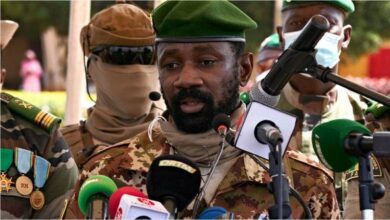
Mali’s Military Junta Agrees To Integrate 26,000 Ex-rebels Into National Army
Mali’s military government on Friday announced its plan to integrate 26,000 fighters of a past northern rebellion into its national…
Read More » -
Mali
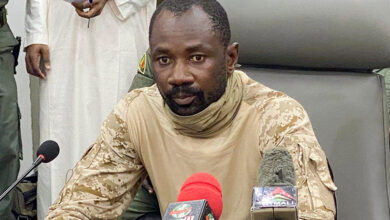
Mali’s Foreign Minister Diop Says His Country Not At War With United Nations
Mali’s Foreign Minister on Tuesday said his country was not at war with the United Nations as relations with the…
Read More » -
Mali
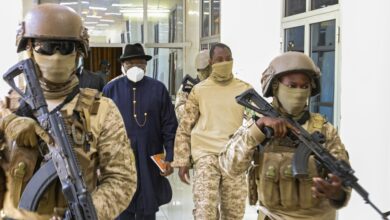
Mali’s Military Government Dismisses UN Peacekeeping Mission Spokesperson
Mali’s military government on Wednesday dismissed the spokesperson for the United Nations Multidimensional Integrated Stabilization Mission in Mali (MINUSMA) over…
Read More » -
Ivory Coast

Togolese Government Begins Mediation On Detained Ivory Coast’s Soldiers
Togolese Foreign Minister Robert Dussey on Tuesday met Ivory Coast’s officials in Abidjan for talks on 49 Ivorian soldiers who…
Read More » -
Mali

Mali’s Military Chief Says He Is Open To Dialogue To Resolve Issue With Ivory Coast
Mali’s military chief Col Assimi Goita on Monday said he is open to dialogue to resolve the issue with Ivory…
Read More » -
Mali
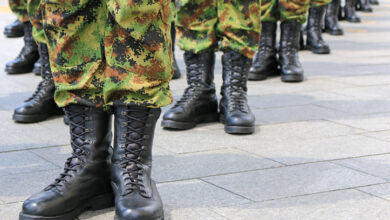
UN Confirms Egypt’s Withdrawal Of Troops From Mali Peacekeeping Mission
The United Nations (UN) mission to Mali, MINUSMA, on Friday said Egypt has decided to temporarily suspend its participation in…
Read More » -
Mali
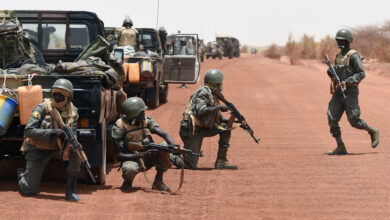
Mali’s Military Junta Suspends Rotation Of UN Forces Due To Security Reasons
Mali’s military junta on Thursday said it will suspend rotations of the United Nation’s peacekeeping mission for national security reasons,…
Read More » -
Mali

Malian Government Arrests 49 Ivory Coast Soldiers, Calls Them Mercenaries
The Malian government on Monday said 49 soldiers who came from Ivory Coast on Sunday have been arrested, reported The…
Read More » -
Burkina Faso
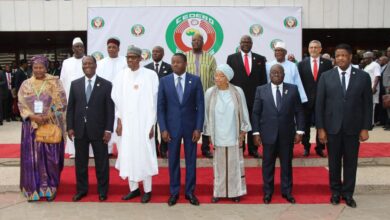
Leaders Of ECOWAS Lifts Economic, Financial Sanctions Imposed On Coup-Hit Mali
Leaders of the Economic Community of West African States (ECOWAS) on Sunday lifted economic and financial sanctions imposed on Mali,…
Read More » -
Mali

Mali’s Transitional Government Sets Election Timetable Ahead Of ECOWAS Summit
Mali’s government has reportedly set a constitutional referendum in March 2023 and the presidential elections in February 2024, reported Africa…
Read More » -
Mali
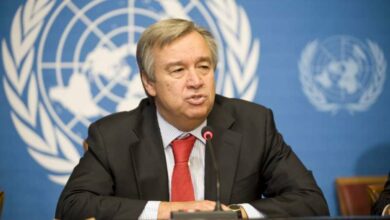
UN Chief Antonio Guterres Condemns Deadly Attacks By Rebels In Mali
The United Nations (UN) Secretary General Antonio Guterres on Wednesday issued a statement expressing his shock and outrage over reports…
Read More » -
Mali
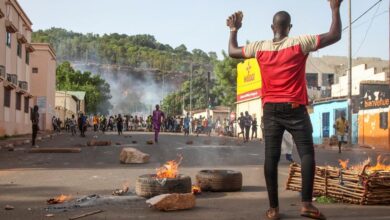
Mali’s Government Confirms Suspected Militants Kill 132 Villagers In Latest Attacks
Mali’s government on Monday confirmed at least 132 civilians were killed in multiple militant attacks on villages in central Mali…
Read More » -
Mali

UN Peacekeeper Dies In A Mine Blast In Northern Mali, MINUSMA Head Confirms
A United Nations (UN) peacekeeper was killed by a mine blast in northern Mali on Sunday as he was participating…
Read More » -
Mali
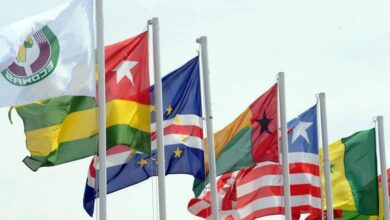
West African Bloc ECOWAS Regrets Mali’s 24-Month Transition Decision
The West African regional bloc, ECOWAS, on Tuesday said it regretted Mali’s ruling military body’s decision to extend the transition…
Read More » -
Mali

Mali’s Military Ruling Body Promises Return To Civilian Rule In March 2024
Mali’s ruling military body on Monday said it has decided to delay a return to civilian rule until March 2024…
Read More » -
Burkina Faso
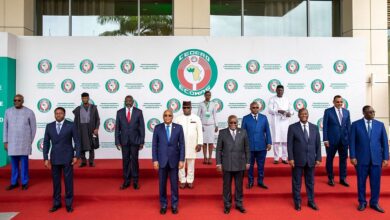
West African Leaders Decide To Continue Sanctions On Mali For Now
West African leaders on Sunday said they have decided to maintain sanctions on Mali for now but they could lift…
Read More » -
Mali
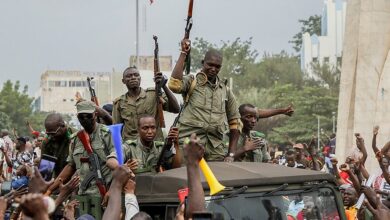
UN Report: Over 500 People Lost Lives In Mali Clashes From January To March 2022
A United Nations (UN) report released on Monday claims more than 500 people lost their lives in attacks carried out…
Read More » -
Mali

Mali’s Military Junta Blames Western Nation For Recent Failed Coup Attempt
Mali’s military junta on Monday said some Western-backed military officers attempted a coup last week, reported Reuters. A “small group…
Read More » -
Mali

Mali’s Military Junta Announces Withdrawal From Regional G5 Sahel Force
Mali’s military junta on Sunday said it was withdrawing from a west African force fighting extremists to protest its being…
Read More » -
Mali

Mali’s Junta Says Togo Leader Ready To Act As A Mediator To Solve Political Crisis
Mali’s foreign minister on Wednesday said Togo’s President Faure Gnassingbe has agreed to act as a mediator in the ongoing…
Read More » -
Mali
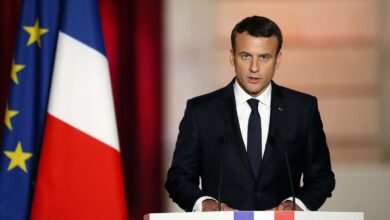
French Government Says Mali’s Junta’s Exit From Defense Agreement ‘Unjustified’
The French government on Tuesday said Mali’s decision to renounce a military cooperation agreement with France is “unjustified,” reported The…
Read More » -
Mali
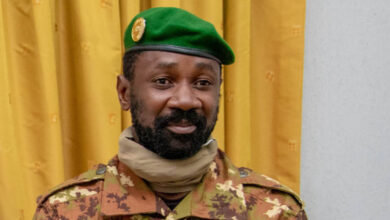
Mali’s Military Junta Breaks Off Defence Ties With France Over Security Violations
Mali’s ruling military junta on Monday said it was breaking off from its defence accords with France, blaming the French…
Read More » -
Burkina Faso

UN Chief Urges Burkina Faso, Guinea, Mali’s Juntas To Hand Power Back To Civilians
The United Nations (UN) Secretary-General Antonio Guterres on Sunday made an appeal to Burkina Faso, Guinea, and Mali’s military junta…
Read More » -
Mali

OHCHR Slams Mali’s Ruling Junta’s Decision To Ban Two French Media Outlets
The United Nations rights office, OHCHR, on Friday slammed Mali’s ruling council’s decision to ban French media outlets, reported UN…
Read More » -
Mali

Mali’s Military Junta Accuses France Of Spying After Mass Grave Video Emerges
Mali’s military junta on Tuesday accused the French military of spying after the French military released a drone-made video that…
Read More »

